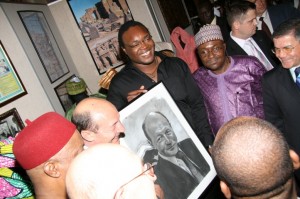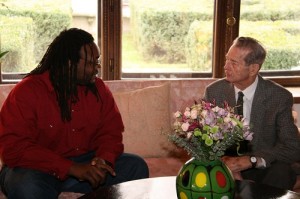Chosen by art - the story of a Nigerian painter and author who embraces life in Romania

 15 years ago, Kingsley Nwabia chose art - or, as he likes to say, was chosen by art. More than 200 paintings and a book after, he finds himself in Romania, where he settled in 2005. One hot summer afternoon, Romania Insider has talked to Kingsley- a natural born story teller too- in his Bucharest apartment, surrounded by an ad-hoc exhibition of his paintings. By Corina Saceanu For years, Kingsley Nwabia's father wanted him to became a doctor. He was on his way to this goal – he was studying microbiology at the university in Lagos, Nigeria. It was towards the end of his university years that he discovered, in an area of the campus fate had brought him to, the painting atelier. Things aligned for Kingsley rather interesting. To impress a girl, he said he was a painter and asked if he could paint her portrait. But he was not a painter – at least not yet. The second day he discovered, by accident, the painting class and hung around for the next two and a half years, trying to borrow the secrets of the trade. He still graduated from microbiology, but chose to follow arts instead, although he has never officially studied arts. This did not come easy on his father. He used to be a bank manager before retiring, and his son's choice of art was not what he had been hoping for. 15 years have gone by since Kingsley started painting. At the beginning, he used to make bracelets and sell them to buy colors for his paintings. He calls himself a self-taught artist.
15 years ago, Kingsley Nwabia chose art - or, as he likes to say, was chosen by art. More than 200 paintings and a book after, he finds himself in Romania, where he settled in 2005. One hot summer afternoon, Romania Insider has talked to Kingsley- a natural born story teller too- in his Bucharest apartment, surrounded by an ad-hoc exhibition of his paintings. By Corina Saceanu For years, Kingsley Nwabia's father wanted him to became a doctor. He was on his way to this goal – he was studying microbiology at the university in Lagos, Nigeria. It was towards the end of his university years that he discovered, in an area of the campus fate had brought him to, the painting atelier. Things aligned for Kingsley rather interesting. To impress a girl, he said he was a painter and asked if he could paint her portrait. But he was not a painter – at least not yet. The second day he discovered, by accident, the painting class and hung around for the next two and a half years, trying to borrow the secrets of the trade. He still graduated from microbiology, but chose to follow arts instead, although he has never officially studied arts. This did not come easy on his father. He used to be a bank manager before retiring, and his son's choice of art was not what he had been hoping for. 15 years have gone by since Kingsley started painting. At the beginning, he used to make bracelets and sell them to buy colors for his paintings. He calls himself a self-taught artist.
'Most people don't believe me. No one on Earth can teach you art. You have to do it, and when the art itself sees how dedicated you are, the art will teach itself to you. With each painting, I learned something else,” says Kingsley.
While in Lagos, he joined AIESEC, the international student association. This is how he got to Romania five years ago, when he first stayed in Cluj – Napoca. He then moved to Bucharest.

Besides painting, he has started writing. His first book draws from his Nigerian roots: Nigerian Folktales and other stories. He started to write it after initially telling the stories to kids in the kindergarden where he was teaching English. Kids loved his stories and so did their parents, so Kingsley had to call back home to learn more stories. Eventually, he has put them on paper and made drawings to accompany the stories. ' I price them based on the value that they have to me' His paintings cost between a couple of hundred ron and a couple of thousand euros, depending on whether they're in oil colors or in charcoal. But
“the artist is not selling color and canvas, if you want that, you can go to the store and buy it. The artist is selling a piece of him, something that comes from the inside,” says Kingsley. “I price them on the value that they have to me. The one with the mask is my pride and joy – initially I wanted to sell it for EUR 3,000- now it's on sale for EUR 11,000,” he says. (You can see the painting in the main photo of this article).
This painting, which took him around two months to complete, lays near us while we talk. Three African masks are staring at me. It is impressive indeed. This is Kingsley's dearest painting – and the one that stayed with him. Other paintings, which are simpler and require less time to complete, were sold faster. It's like that sometimes. “You never know what people like or what will sell. You just paint,” says Kingsley.
“I don't care if nobody ever buys it, it's for those who see the value in it. I have seen people spit on canvas with color and price those paintings at EUR 2,000 – some people buy, some don't,” he goes on.
He just paints and then hopes that the owner of the painting will find him. “I keep telling people: you don't choose your art, your art chooses you.”
Selling paintings keeps him painting. But it's always hard for the artist to let go a piece of art. Kingsley has his unique way of explaining this too.
“To me, a painting is like a daughter, in African context. When a man has a daughter, he loves her, spoils her more than his son, educates her and helps her become the best that she can be. After that, he wants her to end up in a good family. The journey will never be complete until she finds a new home with her husband. When the husband's family sees how good behaved she is, they will praise the parents. So all my paintings are like my daughters. I don't feel satisfied until my painting goes into a new owner's house and brings them joy. It's a sweet and sour feeling.”

Another painting we turn our eyes to displays a black angel and a girl on horseback fighting with the waves. “This one I made when I was heart broken. I had to escape in my happy place, and I had to bring the happy place outside my mind and into the world with this painting. By the time I had finished it, the heart break was cured,” says Kingsley. With his paintings spread around the world, in more places than he has traveled himself, Kingsley finds it hard to keep track of exactly how many he has painted. Some he sells, others he gives away to people – like the ones he has offered as present to King Michael of Romania and to president Traian Basescu. 'To those complaining about Romania: you should try an African country for a change' When he first came to Romania, Kingsley applied his rule when it comes to traveling to new places: go there with your mind blank, without researching anything about that place. “Whenever I travel to a new place, I try to keep my mind blank, I want to be shocked and impressed. I don't research anything. Once you research, you build expectations, and once you have expectations, you open yourself up for disappointment,” he says. He soon found out Romanians should be proud of their country, but most fail to be. On top of it, many Romanians complain about things he labels as 'minor', compared to what he has seen in his home country.
“You should try an African country for a change. Live in an African country for a month – you would never complain about Romania for the rest of your life. People complain about the government – how about turning your tap at home and not knowing if you'll find water. Or work on your computer and power goes down without notice, and power won't come back for a couple of days or a week. People live like that day in and day out, this was the story of my life for years” he says.
He goes on:
“We never know when we have power. We never know when we have water. To make it worse, we have mosquitos from hell which torment you at night so you are slapping yourself sideways trying to sleep. That is daily life for many people and it gets much worse.” “Having experienced that first hand, how will I tolerate someone complaining about living in what I consider paradise? “
Kingsley remembers the hard life he had to face when he was a child, when they had to carry water – a scarce resource- from kilometers away. The kids went to bring water in the evening, after returning from school. And yet he draws energy from happiness – like most Nigerians do. “When I came here, I believed Romanians were the saddest people – while Nigerians, the happiest. People have a problem smiling here, they always complaint about something,” he says. Understanding a bit of Kingsley requires listening him. He has delivered a speech for an TEDx event in Cluj Napoca – see the recording below the article. These 15 years of painting have taught Kingsley to believe in himself.
“For the past 15 years, my dad told me my art was a waste of time. It hasn't been, because I refused to listen. And now he is beginning to change his mind. People will believe in you after you have proved yourself, and you can only do that after you believe in yourself.”
Two other things he lives by are honesty and integrity. “A young man has only two things of value – his name and his integrity. These are the two things that I live by.” Nigerians have the reputations of being fraudsters, says Kingsley. “I wish I could say this is not true, but unfortunately a lot of Nigerians are doing this. But these things are perpetrated by a few. There are many honest Nigerians and I try to keep myself as an example for this. I refuse to get my hands dirty, I refuse to find a gullible Romanian, promise her Heaven on earth to marry her and get papers to stay here.” If you're wondering about the girl who inspired Kingsley to paint- he never got to painting her. corina@romania-insider.com Note: The Kaizarts advertising you will see on this website is a means to support art and it is not paid advertising. Romania Insider choses its subjects and writes about them based on strictly editorial criteria; we do not sell our editorial content. Below is a speech Kingsley has delivered for TEDx in Cluj – Napoca.












